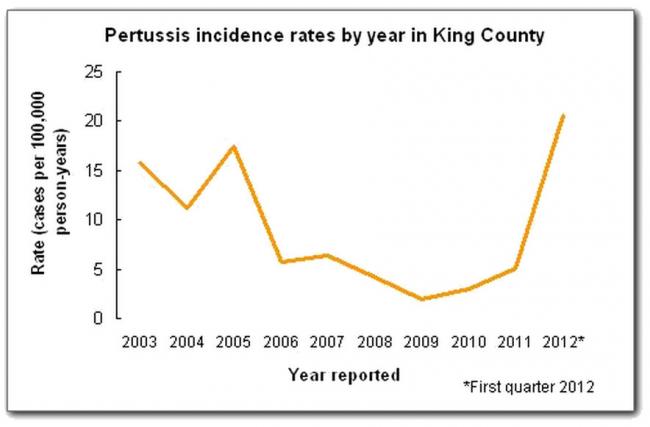Low-cost whooping cough vaccine for uninsured available at local QFC and Bartell pharmacies
Select QFC and Bartell pharmacies in West Seattle are offering low-cost whooping cough vaccines to the uninsured. Cases are high in King County in the first part of 2012.
Wed, 05/30/2012
Information from King County Public Health
Many community clinics also offering low-cost booster shots for clients
Bartell Drugs
9600 15th Ave SW Seattle
M - F 9:00 AM - 9:00 PM
SAT 9:00 AM - 6:00 PM
SUN 10:00 AM - 6:00 PM
Age Group: 14 and older
QFC
4550 42nd Ave SW Seattle
M - F 9:00 AM - 9:00 PM
SAT 9:00 AM - 6:00 PM
SUN 12:00 PM - 5:00 PM
Age Group: 11 and older
People without health insurance or who can't afford to pay for whooping cough (pertussis) vaccine are now able to get it for low-cost at two local pharmacy chains, made available with help from the AmeriCares patient assistance program. Whooping cough continues at high levels in King County and vaccine is the best protection against the disease.
Local QFC and Bartell Drugs pharmacies are now offering low-cost adult whooping cough booster shots (known as Tdap vaccine). A full listing of pharmacy locations with low cost vaccines, as well as locations with vaccine at full cost for those with insurance, is available at www.kingcounty.gov/health/pertussis.
In addition, low-cost whooping cough vaccines for children and adults are also available from many community health care centers and clinics. People seeking low-cost whooping cough booster shots should check with their healthcare providers.
Health care providers and pharmacies may charge a fee up to $15.60 to give the vaccine. In comparison, the normal cost of the Tdap booster shot without insurance is from $60-$100. People who cannot afford the administration fee can ask to have the fee waived.
Vaccine protects against whooping cough, and prevents the disease from spreading to infants, pregnant women, and others. People of all ages can get whooping cough, but infants are at greatest risk of severe illness, hospitalization and death. Pregnant women with whooping cough near the time of delivery may spread it to their newborns.
Talk to your health care provider to make sure all children, teens and adults in your household are up-to-date with whooping cough vaccine, especially if they are in contact with infants or pregnant women.
For more information about whooping cough (pertussis) and where to get vaccine, visit www.kingcounty.gov/health/pertussis
-------------------------------------
More on whooping cough (pertussis)
What is whooping cough?
"Whooping cough" (pertussis) is a highly contagious disease caused by a bacterial infection.
What are the symptoms of whooping cough?
The disease might start like the common cold, with stuffy nose, sneezing, and maybe mild cough or fever. But after 1–2 weeks, severe coughing can begin. If you have whooping cough, you may cough so hard that you gag or vomit. Coughing may be worse at night. Someone with whooping cough may look and feel healthy between coughing episodes.
Infants and children with pertussis often have severe coughing spells that make it hard for them to eat, drink, breathe, and sleep. Whooping cough is most serious for infants – if they have difficulty breathing they may turn bluish. Infants under three months might not have a cough.
How soon do symptoms start?
Symptoms appear 6 to 21 days (average 7-10 days) after exposure to an infected person.
How can whooping cough be treated?
Antibiotics can treat whooping cough (pertussis) and prevent the spread of infection to others, especially when given soon after the start of illness.
How does whooping cough (pertussis) spread?
Whooping cough is very contagious. It spreads easily by coughing or sneezing. Babies often get it from family members who may only have a mild cough and not know they have whooping cough. Untreated, people with whooping cough can spread the infection for as long as three weeks. People with whooping cough should stay out of school, child care or work until 1) they have finished 5 days of antibiotics, or 2) three weeks have passed since the cough started, or 3) the cough is completely gone.
Who is most at risk of serious illness from whooping cough (pertussis)?
People of all ages can get whooping cough, but infants are at greatest risk of severe illness, hospitalization and death. Pregnant women with whooping cough near the time of delivery may spread it to their newborns.
What is the best protection against whooping cough?
The best way to prevent whooping cough (pertussis) is to get vaccinated. Getting the vaccine also prevents the spread to babies. Parents can also help protect infants by keeping them away as much as possible from anyone who has cold symptoms or is coughing. If you've had close contact with someone with whooping cough, you can also take antibiotics to prevent infection.


